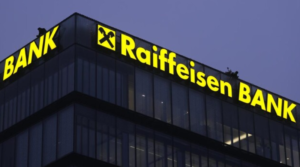
In January-March 2025, Raiffeisen Bank (Kyiv) received UAH 2.21 billion in net profit, which is 12.3% less than in the same period of 2024, when it amounted to UAH 2.52 billion, according to the financial institution’s website.
It is noted that pre-tax profit decreased by 13.3% to UAH 2.91 billion, while net interest income increased by 3.9% to UAH 4.45 billion, and net fee and commission income decreased by 9.4% to UAH 0.45 billion.
It is noted that the share of interest income from certificates of deposit and income from interest rate swap agreements with the NBU in the first quarter of this year decreased to 13% from 21% in the first quarter of last year, while the share of government bonds increased to 21% from 15%.
According to the report, the decrease in net profit is partly due to an increase in employee benefits expenses to UAH 1.33 billion from UAH 1.10 billion in the first quarter of 2024, an increase in depreciation and amortization expenses to UAH 0.41 billion from UAH 0.32 billion and other administrative and operating expenses to UAH 0.69 billion from UAH 0.63 billion, as well as a decrease in net profit from foreign exchange operations to UAH 0.28 billion from UAH 0.40 billion.
At the same time, net loss from revaluation of foreign currency decreased to UAH 0.12 billion from UAH 0.15 billion, and net gain from operations with financial instruments at fair value increased to UAH 0.27 billion from UAH 0.21 billion.
In the first quarter of 2025, Raiffeisen Bank’s total assets increased by 4.1% to UAH 227.0 billion, and equity increased by 8.7% to UAH 30.43 billion.
It is also noted that on April 22, 2025, the bank remotely held an annual meeting of shareholders, at which it was decided to allocate UAH 0.7 million of the profit for 2024 to pay dividends to the holders of the bank’s preferred shares, part of the profit in the amount of UAH 2.14 billion to the bank’s reserve fund, and the remaining UAH 2.14 billion to be left undistributed and sent to the accounts of retained earnings of previous years.
The bank’s strategy for 2025 envisages business development in a highly competitive market amid the war while maintaining a universal digital model. Raiffeisen’s main focuses are digitalization of services, lending growth, customer retention and attraction, operational efficiency and risk management. In particular, the bank will continue to modernize its technological infrastructure and develop its ESG activities. The priorities will include: expanding lending to individuals and businesses, especially under the 5-7-9% programs, improving the digital user experience, diversifying customer acquisition channels, and cooperating with international financial institutions.
According to the National Bank of Ukraine, at the beginning of the year, Raiffeisen Bank ranked 4th in terms of total assets (UAH 238.9 billion) among 61 banks in the country.

In 2024, Raiffeisen Bank (Kyiv) had UAH 7 billion of new investments in its portfolio, of which UAH 3 billion were for agricultural processing projects, said Yuriy Kozak, Director of Large Corporate Clients, Raiffeisen Bank (Kyiv).
“Since the beginning of the war, customer behavior has evolved. At first, they looked at the operating business, at working capital. In 2023, the demand for investment loans to replace machinery and equipment began to recover. In 2024, we as banks saw a real demand for investment. Clients have already come with new production facilities, new capacities, even new plants,” he said at the Ukrainian Investment Congress in Kyiv on Thursday.
Kozak noted that in 2024, Raiffeisen Bank’s portfolio included requests for new investments worth UAH 7 billion, of which UAH 3 billion was for agricultural processing: starch production, soybean processing, oil extraction plants, bioethanol and biomethane production. In addition, in 2024, a number of clients from the agricultural sector began to build new dairy farms.
He added that Raiffeisen Bank actively assists agricultural businesses and provides loans for 5 years. The bank offers foreign currency loans to companies engaged in export activities, which are quite cheap compared to foreign financing. Speaking about hryvnia loans, the expert noted that they are more expensive due to the political realities in the country, the discount rate and the cost of resources.

Ukraine’s economy in 2025 will grow by 4.9% with a slight decrease in inflation rate compared to this year to 8%, such macro forecast of Raiffeisen Bank (Kiev) was shared by the head of its board of directors Alexander Pisaruk.
“As for the dollar exchange rate, we expect devaluation of about 8% in 2025, and the exchange rate itself will be 45.5 UAH/$1 at the end of 2025. The baseline scenario is based on the hypothesis that security risks will improve from the second half of 2025,” he said in an interview with Interfax-Ukraine.
Pisaruk noted that the bank always does stress tests taking into account not only the baseline scenario, but also the best and worst case scenarios.
“But we do not have two fundamentally different development scenarios. All preliminary forecasts on the end of the war did not come true. The head of the NBU said this at the meeting of the European Business Association, and I am ready to sign these words that let’s stop predicting and making mistakes, and let’s just work,” – said at the same time the head of Raiffeisen.
According to him, even if the ceasefire is at the end of the first quarter, it will not dramatically affect performance in 2025.
“It could have an impact on 2026. So even such important things affect with a certain lag. 2025 will be influenced by the current dynamics of inflation growth and the need to curb it,” Pisaruk said.
He added that he would not be surprised if the National Bank has to raise the discount rate as a result of faster-than-expected acceleration of inflation.
“Regarding deposit and lending rates in hryvnia, we do not expect them to deviate significantly from current levels,” the banker pointed out.
He reminded that this process began back in July, and the main factor is the dynamics of the NBU discount rate, which is very likely to be stable until mid-summer 2025.
“But the rates on deposits in US dollars and euros may slightly decrease in response to the relevant decisions of the Fed and the ECB, although they remain quite low in Ukraine now,” – suggested the head of Raiffeisen Bank.
Commenting on the impact of the situation on the front on the mood of the population and business, he stated that this is reflected in the foreign exchange market.
“We observe a significant increase in demand for cash currency, although the supply also remains high. This leads to an increase in interventions by the National Bank, which, fortunately, has reserves for this purpose, formed at the expense of international currency aid,” Pisaruk said.
According to him, the situation now seems quite manageable, as the external aid next year looks sufficient to finance the budget deficit and replenish the NBU’s foreign exchange reserves. The CEO also said that Raiffeisen Bank remains the main supplier of cash currency to Ukraine.
“And who is number two, I don’t even know, because the gap is huge. This is a complicated business – you need to know the counterparties, provide logistics. We know how to do it and have been doing it for decades”, – he noted.
As reported, the GDP of Ukraine, according to the State Statistics Committee, in 2023 grew by 5.3% after a decline of 28.8% in 2022. The National Bank of Ukraine in late October raised the forecast of economic growth for 2024 from 3.7% to 4%, and for 2025 – from 4.1% to 4.3%. At the same time, the NBU in late October worsened the inflation forecast for 2024 from 8.5% to 9.7% and worsened it for 2025 from 6.6% to 6.9% after it fell to 5.1% in 2023 after jumping to 26.6% in 2022. The National Bank of Ukraine (NBU) on November 27 lowered the official hryvnia exchange rate to 41.6010 UAH/$1, the lowest value in its history. In general, since the beginning of 2024, the dollar at the official rate has appreciated by 9.5%, or by UAH 3.59, and since the transition of the National Bank on October 3, 2023 to the regime of managed flexibility – by 13.8%, or by UAH 5.03.

Raiffeisen Bank (Kyiv) has opened its first underground branches in Kharkiv and Dnipro, the bank’s telegram channel reported on Friday.
As specified, the underground branches will operate on the basis of existing ones and will serve customers in case of an air alert. Customer service is already available through a separate entrance leading to the underground premises.
“Underground workplaces allow us to ensure continuity of customer service even in the event of air raids. This is especially important in cities that are subject to constant shelling, which is why branches are forced to stop working on the surface for a rather long time,” Artem Nidzelsky, Retail Business Director of the center of the bank’s southeastern region, said in a statement.
According to him, the continuous operation of the branches allows to support local businesses and provide access to financial services. This, in turn, helps to minimize economic losses for entrepreneurs and the population.
“It is also extremely important that the new initiative creates safer working conditions for employees, allowing them to work more confidently and with less stress,” emphasized Nizelsky.
Underground branches provide all banking services as well as traditional branches, including account opening, deposits, lending, customer consultations and cash payments.
Raiffeisen Bank explained that the first underground bank branches appeared in cities located near the hostilities and constantly under fire. The number and duration of air raids in these cities is increased, customers have limited access to offline services and frequent problems with stable communication.
This step is expected to help maintain economic stability in the frontline regions, preserve customer confidence and provide a sense of stability and security when using banking services, which is especially important in wartime.
In the future, the bank plans to open separate underground branches in Kharkiv, Dnipro and other frontline cities.

Raiffeisen Bank has started issuing unsecured “green” loans to small businesses for construction solar power plants, as well as for the purchase of electric cars and charging stations to them.
As noted in the bank’s statement on its website on Tuesday, both FLPs and legal entities can obtain financing up to 80% of the cost of the relevant equipment and installation.
Under the terms of lending, the loan amount can be up to UAH 9 million for a period of 24 months. The interest rate is 17-19% per annum, without additional commissions.
“Thanks to the new loan program Raif contributes to decentralization of the energy system, development of electric mobility and ‘green’ recovery of Ukraine. Our business clients can reduce their risks, become energy autonomous, ensure the continuity of their work, reduce the cost of electricity and fuel. Having installed SES for loans from Raif, entrepreneurs will be able to produce “green” electricity for their own business needs, charge electric cars of their enterprises and clients with it, and sell the rest to the energy market, receiving additional income”, – commented Elena Shpirko, Raif’s business banking client segment development manager.
The bank specified that as the largest foreign lender to the Ukrainian economy, it issued UAH 1.5 billion of “green” loans to businesses, including for construction SES, production of solar panels, creation of biogas and biomethane plants, biofuel boilers, implementation of energy efficiency projects, etc.

The law on raising the bank profit tax from 18% to 50% in 2023 and to 25% in the following years was adopted without discussions with banks, it is discriminatory and has long-term negative consequences for the investment and business climate in Ukraine, said Oleksandr Pysaruk, Chairman of the Board of Raiffeisen Bank (Kyiv).
“Excessive profits of banks cannot be determined based on the results of one year. Retrospective taxation of excessive profits for 2023, as well as an increase in bank profit taxes in the future, is unreasonable and discourages bank shareholders from investing in this business,” the head of Ukraine’s largest bank with foreign capital said in an interview with Interfax-Ukraine.
Pysaruk emphasized that he supports the need to temporarily raise the bank profit tax in the current circumstances and has publicly stated this. According to him, the version of the law approved in the first reading to increase the tax to 36% for 2024-2025 was discussed with banks and was fair.
According to the banker, the retroactive taxation approved without discussion at the end of the year creates a very dangerous precedent and tax uncertainty for all economic agents, especially for foreign investors. “Retrospective is bad in itself, but when retrospective is linked to 50% instead of the existing 18%, it is a shock,” he added.
Commenting on the 50% rate, Pysaruk explained it as a desire to collect an additional 0.3% of GDP from banks as part of the revision of the program with the IMF, when state-owned banks are already paying large dividends.
“In fact, the payers of this record-high tax are private banks, of which the largest tax burden falls on banks with foreign capital. And the retrospective taxation is compounded by disproportionate and discriminatory treatment of private shareholders of the banking system,” the banker stated.
He noted that the problem is also the unfair singling out of banks from the rest of the economy in terms of raising their income tax to 25% on a permanent basis in the coming years.
“Why are they the only ones to receive the tax increase? Why 25% and why permanently? Why not 28%, 22%, or 20%? … This is an example for investors and business in general: if you are transparent, you will be taxed even more. And at the same time, you leave a bunch of economy that does not pay taxes or pays little,” Pysaruk said.
In his opinion, the tax on banks starting in 2024 should have been discussed as part of the preparation of the National Revenue Strategy prescribed in the program with the IMF, which the Ministry of Finance is obliged to present by the end of this year and which declares the expansion of the tax base.
The head of Raiffeisen Bank also emphasized that banks are a cyclical business, and its profitability should be assessed over a fairly long period of time, on average 7-10 years. According to him, in the period from 2013 to 2023, the total return on equity of Ukrainian banks (excluding PrivatBank and its nationalization) was 69%, i.e. approximately 6% per annum in hryvnia, while the cost of capital in any year after 2013 exceeded 20% per annum.
“That is, the last ten years have been unprofitable for bank shareholders. The situation is much worse for foreign shareholders of Ukrainian banks who calculate their total income in euros. Over the past ten years, the banking system has suffered a total loss of 52%, approximately -8% per annum in euros,” Pysaruk said.
He explained this by the large losses of Ukrainian banks in 2014-2016, the almost fourfold devaluation of the national currency and the inability to receive dividends for several years.
“Today, the banking business in Ukraine is unprofitable. The cost of capital is very high due to high inflation and very high risks in the country. And I’m not even talking about the war,” stated the Chairman of the Board of Raiffeisen Bank.
In his opinion, the adopted law will discourage strategic banking investors from participating in the privatization of state-owned banks, which is necessary given their high market share.
“We may be left with a banking system with an excessive share of state-owned banks for a very long time,” Pysaruk said.
He added that this approach also does not stimulate foreign direct investment in other industries. “This is a very bad story for a country that needs external assistance both during the war and afterwards for development,” the banker said.
Commenting on the impact of the increased tax directly on Raiffeisen Bank, the Chairman of the Board said that in the short term there will be no significant impact, as the bank has excess capital and liquidity. “We will pass the NBU’s stress test without any problems and will continue to support our clients,” Pysaruk said.
At the same time, he believes that some other banks that are not as well capitalized may face problems.
“The National Bank will probably have to mitigate its plans to recapitalize banks, because it was the party that agreed to this decision. Because taxing banks in such a cruel, unfair way and then demanding capital is an additional horror story for investors,” the banker said.
He added that, combined with the NBU’s further increase in capital buffer requirements in line with EU standards, the higher corporate tax will reduce banks’ ability to generate capital to meet the increased demand for loans as Ukraine develops after the war.
Pysaruk also suggested that some banks may appeal to an international court because the adoption of such a law violates the provisions of intergovernmental agreements on investment protection, citing Spain as an example where banks challenged the windfall tax.
The Chairman of the Board of Raiffeisen Bank, who was formerly the First Deputy Governor of the National Bank of Ukraine and then worked for the IMF for three years, also expressed regret that the Fund had agreed to such a tax increase. According to Pysaruk, this is due to the program’s basic assumptions, which are under threat, of ending the war in mid-2024 and a certain level of international assistance.
“The IMF has to draw up a macroeconomic model and calculate the debtor’s ability… to repay the loan. And this tax was probably needed for such a model to be developed. But the price of the issue is exactly this: in order to save this program and continue it, laws are being introduced that reduce Ukraine’s already low investment attractiveness and may hinder plans to attract private foreign capital to rebuild Ukraine after the war,” the banker said.
According to the National Bank of Ukraine, as of October 1, 2023, Raiffeisen Bank ranked 4th in terms of assets (UAH 196.35 billion) among 63 banks operating in the country. Its net profit in January-September this year amounted to UAH 6.14 billion compared to UAH 2.39 billion in January-September last year.
In October 2005, the bank became part of the Austrian banking group Raiffeisen Bank International AG. Currently, Raiffeisen Group owns 68.21% of the bank’s shares, while the European Bank for Reconstruction and Development owns 30%.